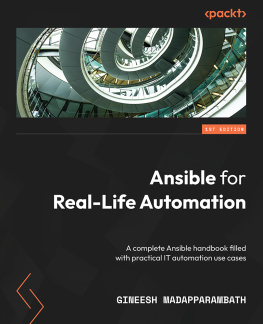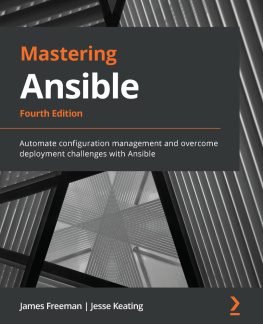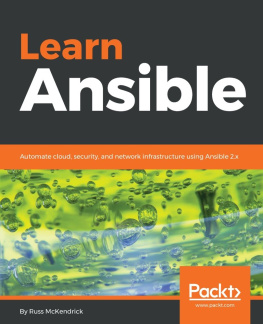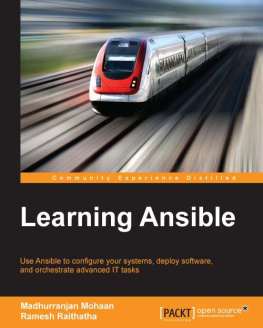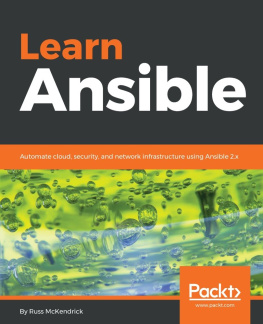Bentley Walter. - OpenStack Administration with Ansible
Here you can read online Bentley Walter. - OpenStack Administration with Ansible full text of the book (entire story) in english for free. Download pdf and epub, get meaning, cover and reviews about this ebook. genre: Computer. Description of the work, (preface) as well as reviews are available. Best literature library LitArk.com created for fans of good reading and offers a wide selection of genres:
Romance novel
Science fiction
Adventure
Detective
Science
History
Home and family
Prose
Art
Politics
Computer
Non-fiction
Religion
Business
Children
Humor
Choose a favorite category and find really read worthwhile books. Enjoy immersion in the world of imagination, feel the emotions of the characters or learn something new for yourself, make an fascinating discovery.

- Book:OpenStack Administration with Ansible
- Author:
- Genre:
- Rating:4 / 5
- Favourites:Add to favourites
- Your mark:
OpenStack Administration with Ansible: summary, description and annotation
We offer to read an annotation, description, summary or preface (depends on what the author of the book "OpenStack Administration with Ansible" wrote himself). If you haven't found the necessary information about the book — write in the comments, we will try to find it.
.Design, build, and automate 10 real-world OpenStack administrative tasks with Ansible.Most organizations are seeking methods to improve business agility because they have realized just having a cloud is not enough. Being able to improve application deployments, reduce infrastructure downtime, and eliminate daily manual tasks can only be accomplished through some sort of automation.Packed with real-world OpenStack administrative tasks, this book will walk you through working examples and explain how these tasks can be automated using one of the most popular open source automation tools Ansible.We will start with a brief overview of OpenStack and Ansible and highlight some best practices. Each chapter will provide an introduction to handling various Cloud Operator administration tasks such as creating multiple users/tenants, setting up Multi-Tenant Isolation, customizing your clouds quotas, taking instance snapshots, evacuating compute hosts for maintenance, and running cloud health checks, and a step-by-step tutorial on how to automate these tasks with Ansible.What You Will Learn:
Efficiently execute OpenStack administrative tasks;
Familiarize yourself with how Ansible works and assess the defined best practices;
Create Ansible playbooks and roles;
Automate tasks to customize your OpenStack cloud;
Review OpenStack automation considerations when automating administrative tasks;
Examine and automate advanced OpenStack tasks and designated use cases;
Get a high-level overview of OpenStack and the current production-ready projects;
Deep dive into OpenStack CLI tools and find out how to use them.Automate real-world OpenStack cloud operator administrative tasks.
Construct a collection of automation code to save time on managing your OpenStack cloud.
Use this step-by-step tutorial to automate such tasks with Ansible.Who This Book Is For:
If you are an OpenStack-based cloud operator and/or infrastructure administrator and are interested in automating administrative functions, then this book is exactly what you are looking for. Having a functioning OpenStack environment is helpful, but most certainly not necessary. iPAD Amazon Kindle, PC , Cool Reader (EPUB), Calibre (EPUB, MOBI, AZW3), Adobe Digital Editions (EPUB), FBReader (EPUB, MOBI, AZW3).
Bentley Walter.: author's other books
Who wrote OpenStack Administration with Ansible? Find out the surname, the name of the author of the book and a list of all author's works by series.

